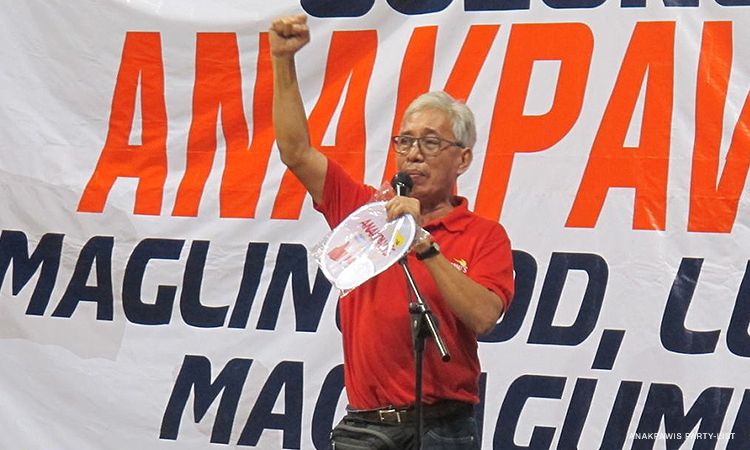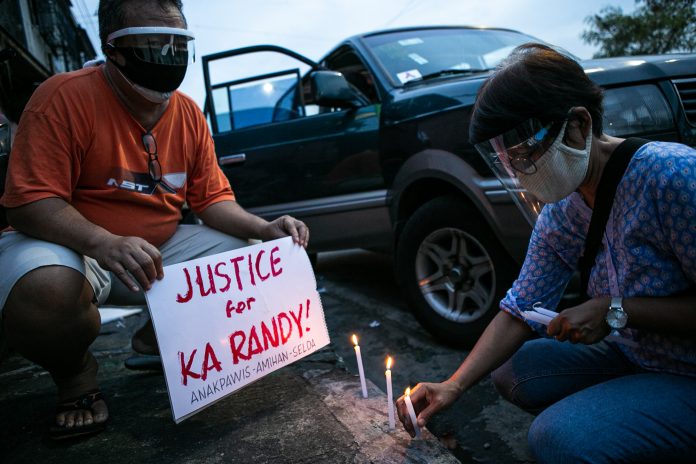Catholic and Protestant church leaders in the Philippines joined calls for the release of the body of slain peace activist Randall “Randy” Echanis who was killed on August 10.
The 71-year old Echanis was killed inside a rented house in Quezon City in the outskirts of the national capital by still unidentified assailants.
The police, however, identified the body as that of a certain “Manual Santiago” based on an identification card found with the deceased.
But Erlinda Echanis, wife of the victim, identified the body as her husband. She said the remains of her husband bore torture marks, multiple stab wounds, and gunshot wounds.
Erlinda later reported that at least 10 policemen “forcibly took” her husband’s body from a private funeral parlor, claiming that the body was not properly identified.
In a television interview, police spokesperson Lieutenant Johanna Sazon said the identity of the dead body has to be proven through a “fingerprint or DNA test.”
“We are appealing to whoever his relative is to cooperate with the Criminal Investigation and Detection Unit for possible identification if he really is Echanis or Santiago,” she said.
“With little need for imagination, this appears as possible cover-up, harassment, and/or cruel negligence,” read a statement from peace advocacy group Pilgrims for Peace.
“Echanis has been murdered. His remains should be treated with respect. His family deserves justice,” added the statement.
Bishop Gerardo Alminaza of San Carlos in the central Philippines called on the National Police to return the body of Echanis to the family.
“I cannot even swallow the kidnapping by the members of the [national police] of his murdered and tortured body, a total disrespect of life,” said the bishop.
The prelate said the incident was “a manifestation of total degradation of our state forces, disrespecting the rights of Filipinos.”
Bishop Alminaza accused the national police of “blind obedience to the minions of this tyrannical regime.”
The bishop described Echanis as a person who “committed his life to the peasants’ struggle for genuine land reform.”
“He brought the concerns of the peasants in the peace negotiations, especially the area on agrarian reform and rural development, as a key component of the comprehensive agreement on social and economic reforms,” said the prelate.
Bishop Alminaza said the killing of Echanis is a “clear mark of shameless immorality.”
The prelate said he adds his “pastoral voice to the common cry” for justice for the slain peace activist.
“We should never be afraid to confront injustice, and continue our cry in the name of the landless farmers, we will never stop confronting this violent regime,” he said.
Lawyers’ groups issued separate statements assailing both the murder of the activist and the seizure of his remains.
Lawyer Edre Olalia of the National Union of People’s Lawyers called the incident “abhorrent, cruel, inhumane, and against Filipino custom.”
Echanis is the second consultant of the National Democratic Front of the Philippines to be killed in as many years.
In January 2019, peace consultant Randy Felix Malayao was shot in the head as he slept on a night-time bus en route to his hometown of San Pablo in Isabela province.

At the time of his death, Echanis was chairman of Anakpawis political and long-time deputy secretary-general of the Kilusang Magbubukid ng Pilipinas.
Echanis is credited as a major contributor in the drafting of the Genuine Agrarian Reform Bill now pending in Congress.
Citing his expertise and long record of pro-farmer advocacy, the National Democratic Front negotiating panel tapped Echanis to serve as consultant on agrarian reform and farmers’ issues.
He helped hammer out the Agreement on Agrarian Reform and Rural Development which was supposedly set to be signed in 2017 by government and rebel peace negotiators.
In 2016, Echanis went to the Manila and Marikina city councils to personally receive resolutions backing the resumption of formal peace negotiations between the government and communist rebels.
Echanis started his political activism while he was a student in the 1970s when he led a local chapter of the activist group Kabataang Makabayan.
He participated in the First Quarter Storm protests of the 1970s and went to the provinces to organize farmers’ communities.
Echanis was arrested and charged under the administrations of former presidents Ferdinand Marcos, Corazon Aquino, and Gloria Macapagal Arroyo. But the courts dismissed the cases filed against him.
Upon his release after the downfall of the Marcos dictatorship, Echanis joined the Samahan ng Ex-Detainees Laban sa Detensyon at Para sa Amnesty or SELDA.
He backed the filing of the landmark class-action suit against Marcos.
Echanis also served in the preparatory commission for Partido ng Bayan, which activists formed after Marcos’ downfall in 1986.
Echanis is survived by wife Linda, children Amanda and July, and their grandchildren.
Tonyo Cruz and Mark Saludes contributed to this report.









